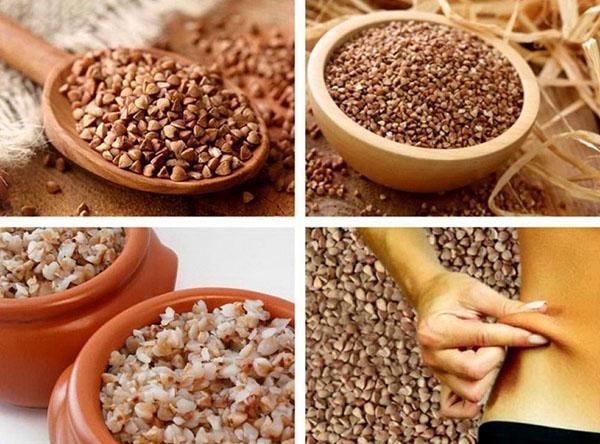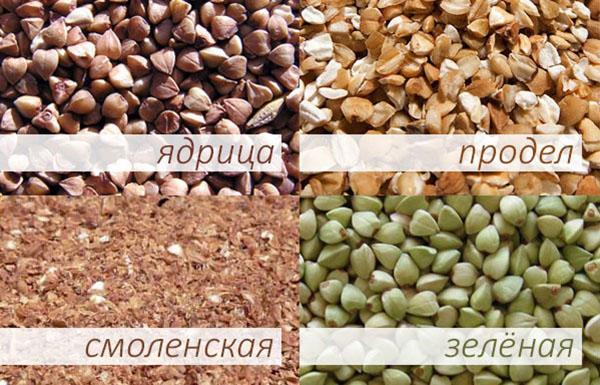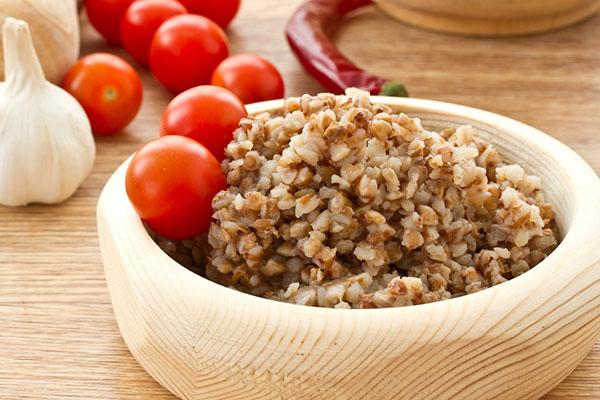The benefits and harms of buckwheat for the health of pregnant women, men and children
 This fragrant porridge was given to children in the kindergarten, workers for lunch, and aristocrats for breakfast. The health benefits and harms of buckwheat were known back in the 6th century AD. e. In addition, it is considered a low-calorie product: 100 g of boiled cereals contains 105 kcal, and raw - 313 kcal. For this reason, it is very often attributed to those who follow a strict diet. The medicinal properties of the cereal crop are due to its unique chemical composition. Having familiarized yourself with it, you can understand how to best apply the "queen" of all croup.
This fragrant porridge was given to children in the kindergarten, workers for lunch, and aristocrats for breakfast. The health benefits and harms of buckwheat were known back in the 6th century AD. e. In addition, it is considered a low-calorie product: 100 g of boiled cereals contains 105 kcal, and raw - 313 kcal. For this reason, it is very often attributed to those who follow a strict diet. The medicinal properties of the cereal crop are due to its unique chemical composition. Having familiarized yourself with it, you can understand how to best apply the "queen" of all croup.
The chemical composition of buckwheat is a visiting card of the famous cereal

The most popular types of culture are:
- unground;
- green;
- done;
- Smolensk.
The first and second grades are large grains, and the other two are varieties of buckwheat with varying degrees of crushing. Still, whole cores bring more benefits to the body. They contain countless amounts of all kinds of macro- and microelements. In addition to calcium, potassium, iodine and magnesium, they are rich in selenium, iron, nickel, zinc, fluorine and other components.
The beneficial properties of buckwheat are possible due to a number of vitamins:
- IN 2. The compounds remove toxins from cells.
- Vitamin B6. Normalizes the functioning of the nervous system as a whole.
- AT 9. Responsible for tissue renewal at the cellular level.
- PP. Promotes the breakdown and elimination of lipids from the body.
- A. Improves vision, and also enhances human immune defenses.
- E. It is a powerful antioxidant. It has a positive effect on the reproductive capacity of male and female organs.
Buckwheat porridge is included in the diet of athletes. The amino acids contained in it are involved in the formation of proteins, which make up most of the muscle mass.
 All of these chemical compounds are extremely necessary for patients suffering from diseases of the digestive system. Interacting with the mucous membrane, these components restore its structure. They are especially beneficial for pregnant women, as well as the fetus.
All of these chemical compounds are extremely necessary for patients suffering from diseases of the digestive system. Interacting with the mucous membrane, these components restore its structure. They are especially beneficial for pregnant women, as well as the fetus.
Among other things, the effect of buckwheat on the body is due to its constituent parts:
- Folic acid. Normalizes the blood circulation in diseases of the cardiovascular system. Takes an active part in the formation of the nervous system, as well as the brain in the fetus.
- Magnesium. The chemical element strengthens bone tissue. In addition, it serves as an irreplaceable psychoemotional modulator.
- Fiber. It is recommended for diseases of the gastrointestinal tract, as it is an integral component of a successful digestion process.
 With such a medical portfolio, this cereal can be considered not only an invaluable food product, but also an excellent therapeutic and prophylactic agent. Now it is worth getting acquainted in detail with some of the advantages and disadvantages of this cereal crop.
With such a medical portfolio, this cereal can be considered not only an invaluable food product, but also an excellent therapeutic and prophylactic agent. Now it is worth getting acquainted in detail with some of the advantages and disadvantages of this cereal crop.
The health benefits and harms of buckwheat from the point of view of experts
 Regardless of the method of preparation, cereals retain their medicinal properties. Therefore, it is often boiled, tormented in the oven / low heat, or steamed. Also, pour the porridge with water or kefir overnight. In the morning, the kernels swell and taste no different from the boiled version. Still, not everyone likes such a dish. To fix this, you need to find out a few more details of how buckwheat is useful for the body. And again you need to return to its composition.
Regardless of the method of preparation, cereals retain their medicinal properties. Therefore, it is often boiled, tormented in the oven / low heat, or steamed. Also, pour the porridge with water or kefir overnight. In the morning, the kernels swell and taste no different from the boiled version. Still, not everyone likes such a dish. To fix this, you need to find out a few more details of how buckwheat is useful for the body. And again you need to return to its composition.
A special place in it is given to 3 flavonoids (antioxidant):
- Quercetin. Essential for the prevention of cancer. In addition, the connection makes the walls of the vessels strong, and also cleans them of toxins and other formations.
- Vitexin. Gives the blood vessels a more elastic structure and is responsible for their expansion. This flavonoid plays a key role in the enzymatic metabolism of the heart muscle.
- Rutin. It has a strengthening effect on the vascular system, especially in combination with vitamin C. For this reason, it is extremely necessary for patients in the postoperative period. Also, the compound increases the body's resistance to dangerous infections.
 As the researchers note, the health benefits and harms of buckwheat depend on the characteristics of each individual. With a potassium deficiency in patients, the water-salt balance is disturbed. Iron deficiency is accompanied by oxygen starvation, which can lead to anemia. However, buckwheat contains up to 38% iron and 15% potassium. In this regard, regular use of this product normalizes the level of hemoglobin in the blood.
As the researchers note, the health benefits and harms of buckwheat depend on the characteristics of each individual. With a potassium deficiency in patients, the water-salt balance is disturbed. Iron deficiency is accompanied by oxygen starvation, which can lead to anemia. However, buckwheat contains up to 38% iron and 15% potassium. In this regard, regular use of this product normalizes the level of hemoglobin in the blood.
A note for those who are gluten intolerant. Unlike all other cereals, buckwheat does not contain gluten. Therefore, it is a unique analogue of barley, wheat, rye and oats.
Buckwheat porridge is a faithful "companion" of men
 100 g of this cereal contains up to 12 g of protein, which is of vegetable origin. These organic matter normalizes the activity of the nervous and endocrine systems. Thanks to this stabilization of metabolism in the body, many were able to lose excess weight in the shortest possible time. This is also due to the high digestibility of the cereal - up to 80%.
100 g of this cereal contains up to 12 g of protein, which is of vegetable origin. These organic matter normalizes the activity of the nervous and endocrine systems. Thanks to this stabilization of metabolism in the body, many were able to lose excess weight in the shortest possible time. This is also due to the high digestibility of the cereal - up to 80%.
 Moreover, the benefits of buckwheat for men can be traced in its ability to restore reproductive abilities. Scientists have researched that zinc, magnesium and other trace elements contained in cereals improve potency. However, in order to achieve the desired result, it is necessary to follow an appropriate diet. In addition, not every type of cereal is suitable for such a case. In most cases, the manufacturers of these food products produce low quality products.
Moreover, the benefits of buckwheat for men can be traced in its ability to restore reproductive abilities. Scientists have researched that zinc, magnesium and other trace elements contained in cereals improve potency. However, in order to achieve the desired result, it is necessary to follow an appropriate diet. In addition, not every type of cereal is suitable for such a case. In most cases, the manufacturers of these food products produce low quality products.
What else is buckwheat porridge useful for? According to statistics, more and more men suffer from depression. To get out of the depression, the hormone dopamine is needed. Regular consumption of this porridge contributes to its sufficient production.
Contraindications to buckwheat
 The listed beneficial properties of the "queen" of cereals encourage many to add it to their diet. At the same time, not everything is as rosy as it seems. After all, there are those people for whom buckwheat is contraindicated. Sadly, some seriously ill patients are forbidden to eat it. In this regard, scientists have made several sensational discoveries.
The listed beneficial properties of the "queen" of cereals encourage many to add it to their diet. At the same time, not everything is as rosy as it seems. After all, there are those people for whom buckwheat is contraindicated. Sadly, some seriously ill patients are forbidden to eat it. In this regard, scientists have made several sensational discoveries.
It is not recommended:
- Women over 45 years of age. With regular use of the product, they begin to develop or progress intensively osteoporosis.
- Having problems with blood clotting.
- Suffering from stomach ulcers.
- With constipation or increased intestinal gas production.
- Children. An excess of certain trace elements (magnesium, potassium, iron and zinc) in the body leads to the fact that calcium begins to be absorbed very slowly. As a result, unused joints are washed out of the bone tissue, which makes the bones very fragile.
Although it is very useful for pregnant and lactating mothers, you should not get too carried away with porridge. Such a rich diet can cause an allergic reaction in the fetus.
 For patients with diabetes mellitus who suffer from chronic renal failure, cereal culture is not recommended. As can be noted, the health benefits and harms of buckwheat are very contrasting. Such differences often raise many questions. Therefore, before you self-medicate or go on a regular diet, you should consult your doctor.Only such mutual cooperation will bring 100% results.
For patients with diabetes mellitus who suffer from chronic renal failure, cereal culture is not recommended. As can be noted, the health benefits and harms of buckwheat are very contrasting. Such differences often raise many questions. Therefore, before you self-medicate or go on a regular diet, you should consult your doctor.Only such mutual cooperation will bring 100% results.